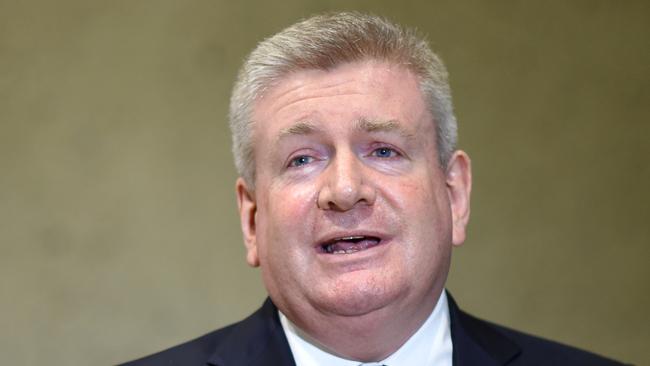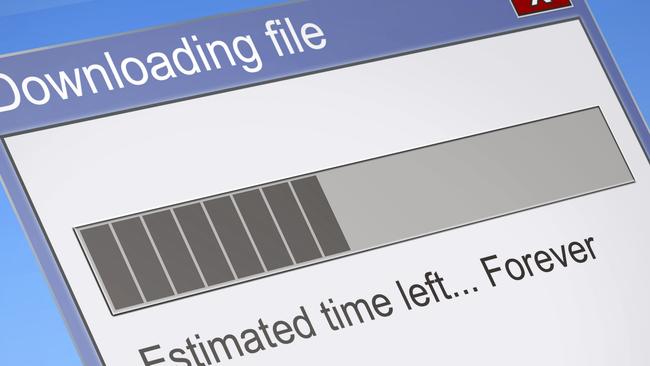A study in slow: Telcos, NBN, trade blows over broadband charges
A POWER struggle between Australia’s telcos and the NBN is costing you — and keeping your internet frustratingly slow.
Online
Don't miss out on the headlines from Online. Followed categories will be added to My News.
A POWER struggle between NBN Co and the telcos who sell their product is costing consumers — not in terms of cash, but internet speeds.
Basically fast broadband exists, but only if you, and your internet service provider (ISP), are prepared to pay for it.
The long-running battle and finger-pointing between NBN Co and ISPs such as Telstra, Optus, iiNet, Macquarie Telecom and Vodafone Hutchinson appears little more than an old-fashioned margin squeeze between wholesalers and retailers. But critics of the NBN Co’s controversial Connectivity Virtual Circuit (CVC) usage charge say affordable, top-speed NBN internet won’t be a reality to the majority of consumers until the charge is abandoned.
Otherwise, it seems it’s a choice: you can have it cheap and slow, or expensive and fast.
And just who is right is something nobody — including the Australian Competition and Consumer Commission, politicians and the telecommunications ombudsman — seems able to unravel.
Anyone who has ever been hit with excess data usage charges or a huge hike in their bill for overseas roaming will find it hard to sympathise with a telco crying poor. It’s easy to see why consumers are finding it hard to care.
But telcos warn as more people sign on for the NBN, the current “punitive” pricing structure is turning ISPs off paying extra for fast data speed access packages.
That means instead of super-fast internet, consumers are getting bottlenecks and slowdowns, according to David Forman from the Competitive Carriers Coalition (CCC), which represents non-Telstra telcos including Macquarie Telecom and Vodafone Hutchinson.
The CCC called last week for permanent changes to NBN Co’s mandatory charging structure, saying if it was not amended, consumers would continue to suffer slow speeds because commercial reality was they couldn’t provide them. The concerns were quickly echoed by Optus and TPG.
Mr Forman warned the escalating cost for ISPs to pay extra data charges to NBN Co was limiting speeds, and causing a usage bottleneck that lessened the benefits of the NBN.
At the core of the argument is a simple margin squeeze, Mr Forman said, because of NBN Co’s pricing structure.
NBN Co says its pricing model is designed for CVC charges to fall as demand for bandwidth grows.

That pricing model includes an Access Virtual Circuit monthly charge (essentially a base charge) as well as the CVC charge (equivalent to a usage fee), which is borne by the retailers.
The telcos say as internet data usage goes up, they pay increasing usage fee totals to NBN Co, which can’t be passed on to consumers, who are largely on plans with unlimited data usage.
It’s costing telcos more to deliver data over the NBN, slashing their profits.
Consumers subscribing to NBN packages sign on for fast internet, but only receive those speeds if telcos buy enough capacity — and the telcos say they are struggling to, or choosing not to buy it under the CVC regimen.
So fast speeds exist, but commercial reality means they not easily accessible.
The CVC charge has been reduced twice and is now $15.75 per megabits per month, and the telecommunications industry has taken aim at the CVC charge with a concerted effort to have it substantially lowered.
Communications Minister Mitch Fifield says NBN Co is “acutely aware of the issue”, and telcos suspect there will be a slight reduction of CVC charges within weeks, but Mr Forman says that won’t solve the problem long-term.
He said while the problem was addressed in increments, the potential for big bottlenecks in download speeds would continue.
“It could leave retailers unable to provide an acceptable service to end users for a reasonable price,” he said.

“Fundamentally we have is an old-fashioned wholesale-retail margin squeeze, caused by the way the way telcos have to buy services from NBN, but it affects consumers in terms of internet speed,” Mr Forman said.
“Consumers have these lovely flat-rate broadband pricing plans now. But when the retailers buy a connection to your house from NBN, they have to buy two things: an access service, which is a fixed rate every month, and the price of that changes depending on how fast the connection is.
“Then they also have to pay the CVC, essentially a usage charge. As everybody downloads more data, the retailer has to pay NBN more for that usage charge.
“That’s all very well but that amount of data that people download is growing so fast. It increased about 10 times from 2010 to 2015 and almost doubled from 2014 to 2015.”
Retailers can’t afford to buy more CVC capacity at the same pace usage has grown.
“The result is it costs the retailer more money to buy and deliver a service to the customer for which they are getting paid the same, and it squeezes the margin away,” Mr Forman says.
He suspects NBN Co will drop prices in the next couple of weeks “but they’ll dial it down just enough to make the pain go away at the moment, and then it will creep back up and then they will dial it down again”.

“But it won’t solve the problem ultimately, and some people will continue to find NBN painfully slow, and MPs will continue to get phone calls from constituents asking why the NBN is so rubbish,” he said.
Optus has warned the pricing model — which has been lowered in increments, but not quickly enough to reflect increased downloads — has the potential to limit the benefits of the NBN.
During busy times when use is heavy, “customers are unlikely to be getting the speed expected”, Optus says.
But NBN boss Bill Morrow says ISPs have to do their bit to keep costs low, not just rely on lower access charges.
While pledging that NBN Co would continue to reduce access charges, Mr Morrow said telcos had to look at their own cost structures.
“They have to look at their cost structure, they have to look at what retail price that they can actually command — and have they even tried going out to see what people are willing to pay?” he said.
“Clearly, everybody wants a cheaper price, but that doesn’t necessarily mean we all get it.”

Originally published as A study in slow: Telcos, NBN, trade blows over broadband charges



